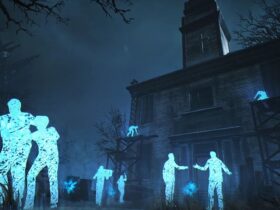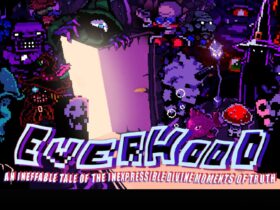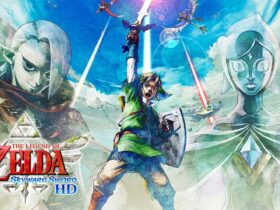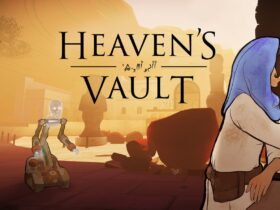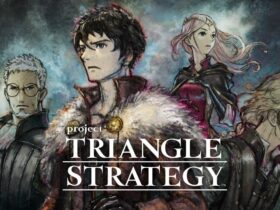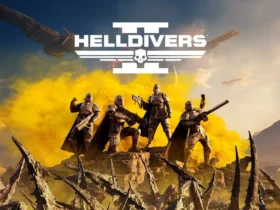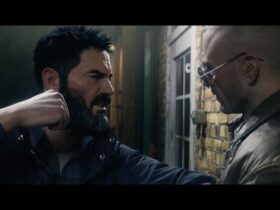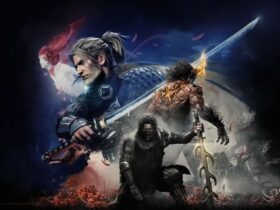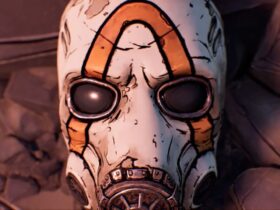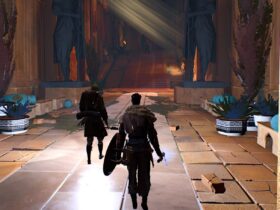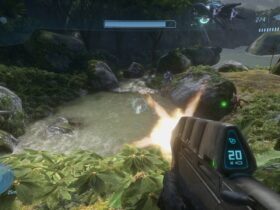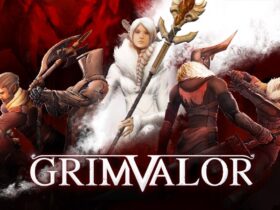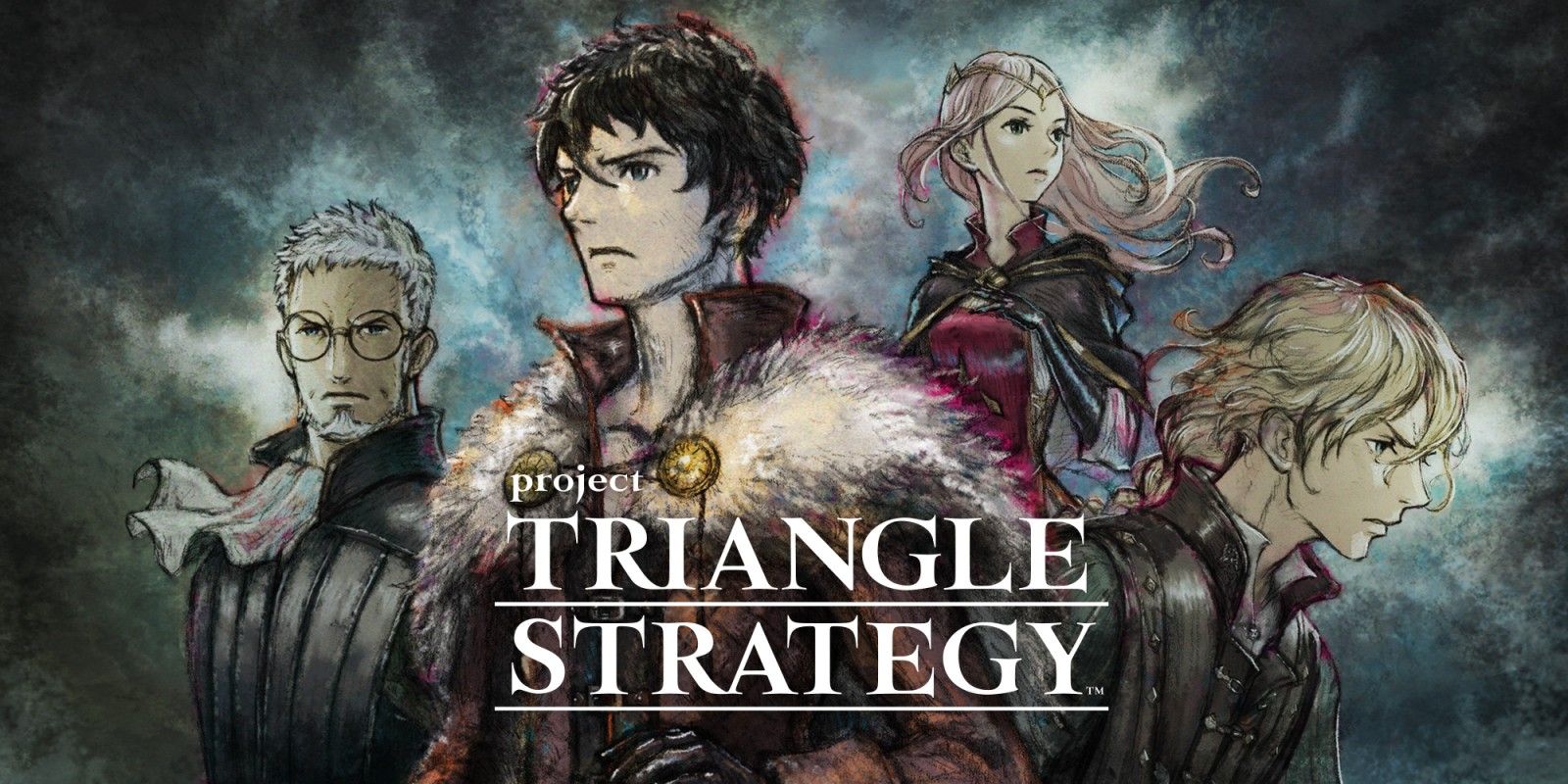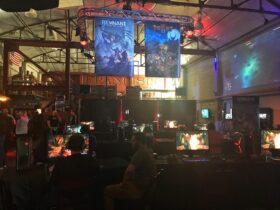This is a thing about the Project Triangle Strategy demo and its bad voice acting, so read on if you want to hear my thoughts about these two things.
Intro
It’s difficult to know what to make of Square Enix’s second installment in the HD-2D series, Triangle Strategy. For anyone who needs to be caught up to speed, Project Triangle Strategy is the working title for a new tactical RPG that was announced in February’s Nintendo Direct. “HD-2D” refers to the distinct and Square Enix -trademarked style that makes use of a combination of detailed sprite work and 3D effects. Take a look at the image below.
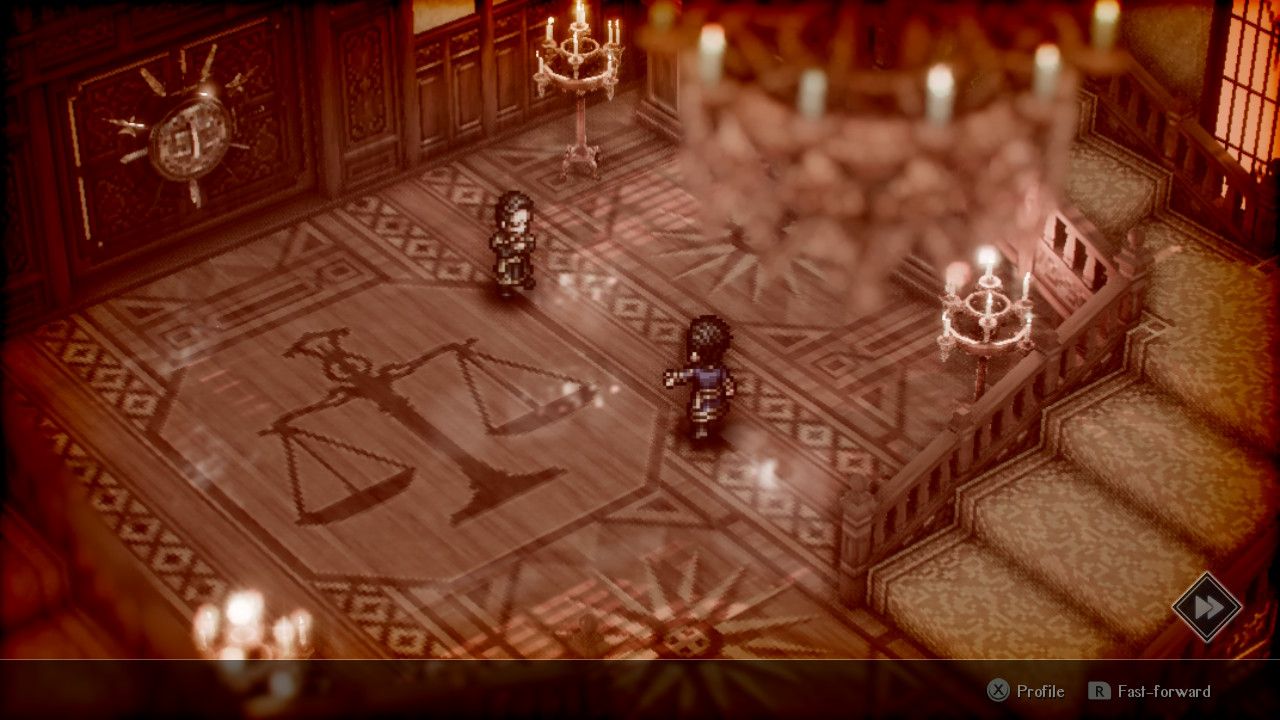
The game looks nice, but does it play nice? What might the demo tell us about the final quality of the game? This article is me taking a stab at these questions. Having played through the entire demo, my feelings about the game could be described as “mild interest” and “a general lack of excitement.”
But knowing my visceral reaction to the game and describing why I feel this way about the game are two very different things. The game’s release is at least a year out, so the primary goal of this article is not to review Triangle Strategy. Instead, it’s an analysis that seeks to answer the question, “What would it take to turn Triangle Strategy (TS) into a good game?”
Briefly, there are a lot of promising things about TS, but the game is held back by bad voice acting and a slow story, among a few other things.
Voice Acting, p.1, The Anime Argument
Let’s get this out of the way first: the voice acting in TS is its weakest component. This wouldn’t really be an issue for me if I was playing the game just to play the game. You can turn down the voice volume all the way to zero, and it doesn’t bother me to read lots of text, but because I’m the kind of masochist called “game critic,” I felt I was obligated to keep listening. Ideally, I would listen to the Japanese VA, but there is no option to switch the voice language in the demo (although I expect there will be in the final game). As such, it’s important to note that all of the criticism in this article regarding voice acting pertains only to the English language voice acting.
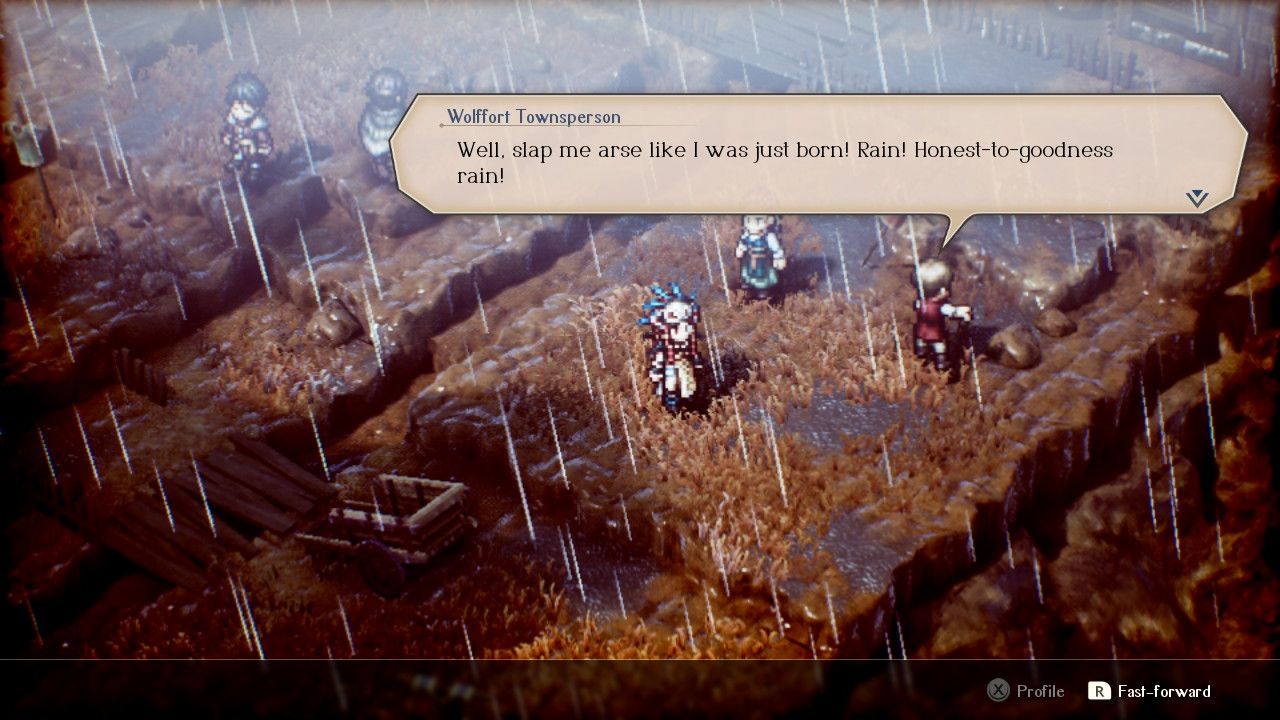
To me, the voice acting sticks out like a sore thumb. But your mileage may vary on this. I think the arguments around the quality of English-language voice acting in Japanese-developed games follows a similar pattern to the dub-or-sub argument w/r/t anime. I personally cannot stand English-dubbed anime. I find that there is often an issue with lip-syncing and timing, and that the actors end up sounding awkward. I feel that the show’s original voice actors usually have a better feel for their character’s emotional identity. It also helps that, because I don’t understand the language of Japanese, it probably means it’s easier for me to let unnaturalistic dialogue go unnoticed.
My thinking follows that my bias persists whether we are considering an anime or a game with Japanese voice acting. The thing is though, in a game like TS whose characters are represented by sprites, there really isn’t an issue of timing or lip-syncing. So, it has to come down to the more nebulous problem of whether the dialogue “sounds right.”
And a large amount of the English voice acting in TS just doesn’t (sound right). That’s not to say there aren’t some well-acted lines. The voice of Gustadolph, the main villain of the story, stands out from the rest of the cast in a good way. The voice actor’s take on the cruel, politically conniving villain archetype, with his cool and level-headed tone, is interesting and well-executed. But unfortunately, I don’t have much positive to say about the rest of the cast. Their performances range from average to mediocre to just plain bad.
Voice Acting, p.2, Something’s Just Wrong Here
Is it unfair for me to say this without further explanation? What do I mean when I say that the voice acting doesn’t “sound right?” Without getting too far into it, there are a variety of problems that keep the dialogue from feeling natural. In general, the dialogue is overacted. Most characters are sometimes overdramatic or too direct. Benedict, the advisor to the main protagonist of the story, always delivers his lines in the same way and with zero emotional tact.
I do not envy the job of being an English voice actor for Triangle Strategy. The sheer amount of dialogue certainly could make it difficult to give a good performance, especially when not given ample time and good direction. (I don’t know if this is what went wrong; I’m just giving an example of how things could have gone wrong.)
But just as the quality of a story and its writing and dialogue can sometimes be covered by stellar voice acting, bad voice acting can highlight a lack of quality in a story and its writing and dialogue.
So Let’s Take a Closer Look at Triangle Strategy’s Story, Writing, and Dialogue
The story drags. I don’t mind a slow burn, but TS’s scenes are just too long. The dialogue isn’t sharp; it’s messy and cumbersome. Scenes are prolonged because characters take too much time to communicate something that we already know, is unimportant, or is uninteresting.
The choice to include voice acting in your game needs to be deliberate. It can’t just be an add-on. You shouldn’t write dialogue that’s intended to be read from a text box and then turn it into a script to be fully acted by a cast of characters. If you choose for every bit of major dialogue to be voice-acted, it completely changes the dynamic of the game. On top of what the text alone communicates, you’re now making a game that contains several new nuanced components: acting, sound, voice, tone, and etc.
Voice Acting, p.3, In the Shoes of a Game Developer
Ask yourself, do the character’s voices add something that isn’t already contained in the dialogue-when-read? Are the actors making interesting decisions in the way they deliver their lines? Do they give the dialogue much-needed, genuine emotion? Is your dialogue ready to be acted? Is it refined and crisp enough, so that the actors have something good to work with? Is the quality of writing in your dialogue going to draw out a great performance? Sorry, but in the Project Triangle Strategy demo, the answer to all these questions in any given scenario is almost always no.
When you make the decision to include voice acting in your game, it amplifies everything about the dialogue. Voice acting draws out imperfections and weaknesses as much as it enhances the good parts of your script. The voice acting needs to be on-point or else it will not sound right to the player’s ear. Players will turn the voice volume down to zero or switch the voice language, and then what was the point of hiring a team of voice actors to read your script? Perhaps the issues with the dialogue can be overlooked when only read and not heard. Out loud, the experience is different.
To be fair, voice acting in video games has for a long time been an area that needs improvement, and the voice acting in Triangle Strategy isn’t as infamously bad as in either of these clips. Lately, it seems that game developers feel that they need to have “full voice acting” to add to the game’s selling points, but just because it sounds impressive (not necessarily the voice acting itself, but the concept of) doesn’t mean that it’s the right decision for every game.
OK… But a Game is More than Just Voice Acting
And there are other problems with TS. Again, the story is too slow. An interesting core narrative is ruined by too much chaff. New recruits often have weak backstories (of the three recruitment stories in the demo, Julio’s is good but Medina’s and Ezana’s are lousy) and recruiting them is divorced from the main story. The encampment, where you go to prepare for battle, also feels completely removed from the context of events (you access it only through a menu). The voting system lacks depth. House Wolffort’s legendary heirloom, The Scales of Conviction, a magical artifact which tallies up votes, is completely unnecessary because you don’t need magic to tally up votes. Everyone says “pray tell” too often.
But all these problems are kind of exacerbated when you are listening to characters say their lines. The story goes even more slowly. Bad acting makes interesting lines much less interesting and bad lines even worse. It’s harder to ignore all the jarring disconnects (like the recruitment (back)stories and the encampment). You have to listen to people force themselves to say “The Scales of Conviction” in a serious tone. And everyone says “pray tell” too often.
Square Enix is doing a player survey for the game, which they announced in their Nintendo Direct trailer. But the disappointing thing about asking for a survey at this point in the game is that TS is too far along and has a few too many systemic issues for it to be (probably) profitable for them to do a real fix-up.
But Now for the Good Stuff
I hope I haven’t made Triangle Strategy seem unplayable. There are some good ideas in this game. I like that there are side stories between the main events of the game that you can view (by selecting them from the overworld map) at will. This means you get to control the pace of the story a bit by choosing which scenes you view in which order (and they’re skippable).
In the game, major turning points are decided by a vote, during which all the members of your party participate. This voting system is a good idea that could be great with a little more work. If persuading your allies to your side was more interactive or difficult or unpredictable (or all of the above), the added tension would give the final decision a lot more weight.
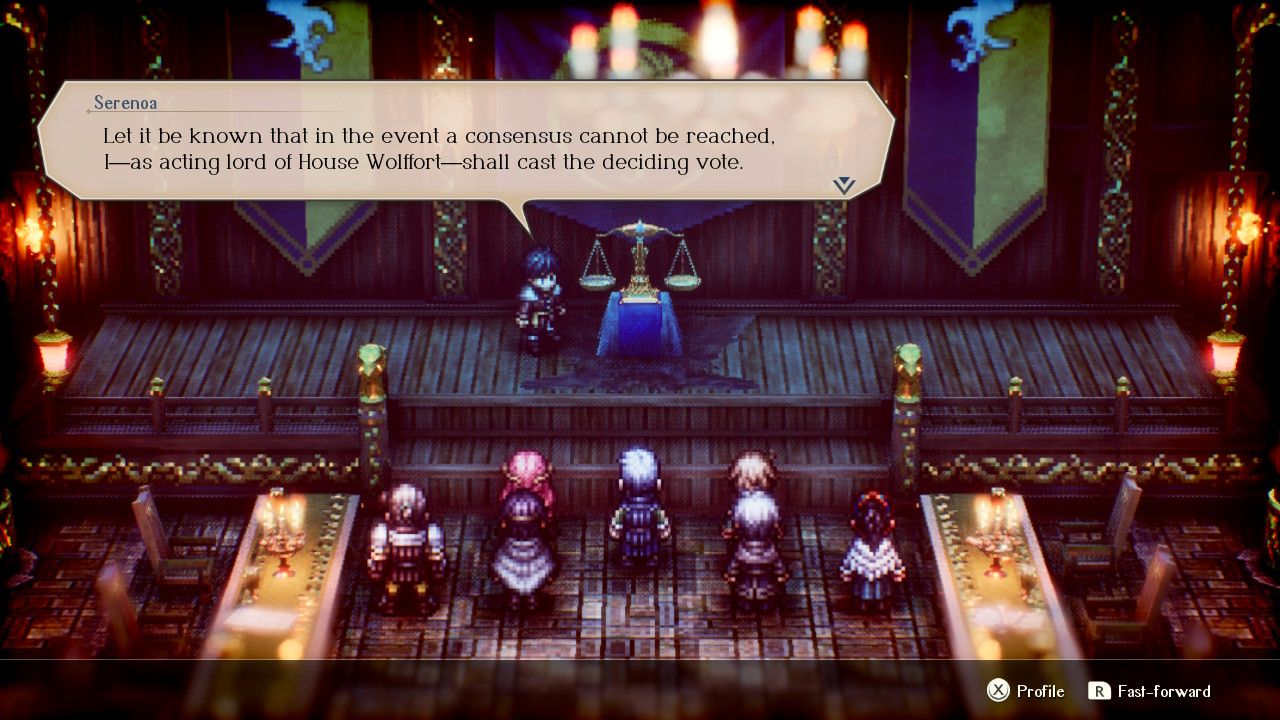
But the huge changes that the vote brings to the game are genuinely interesting. There are two completely different stories and battles in the demo, depending on how the vote goes.
The actual battles are decently engaging. There is a lot of variety between different battlefields and the focus on differences in elevation as a part of tactical play is interesting. Maps have gimmicks, like fire traps and gondola lifts, that disrupt the traditional pattern of a battle. The “exploration phase” kills the momentum of the story, but it does give you a chance to obtain a sense of the space of the battlefield before you begin a battle, which is nice.
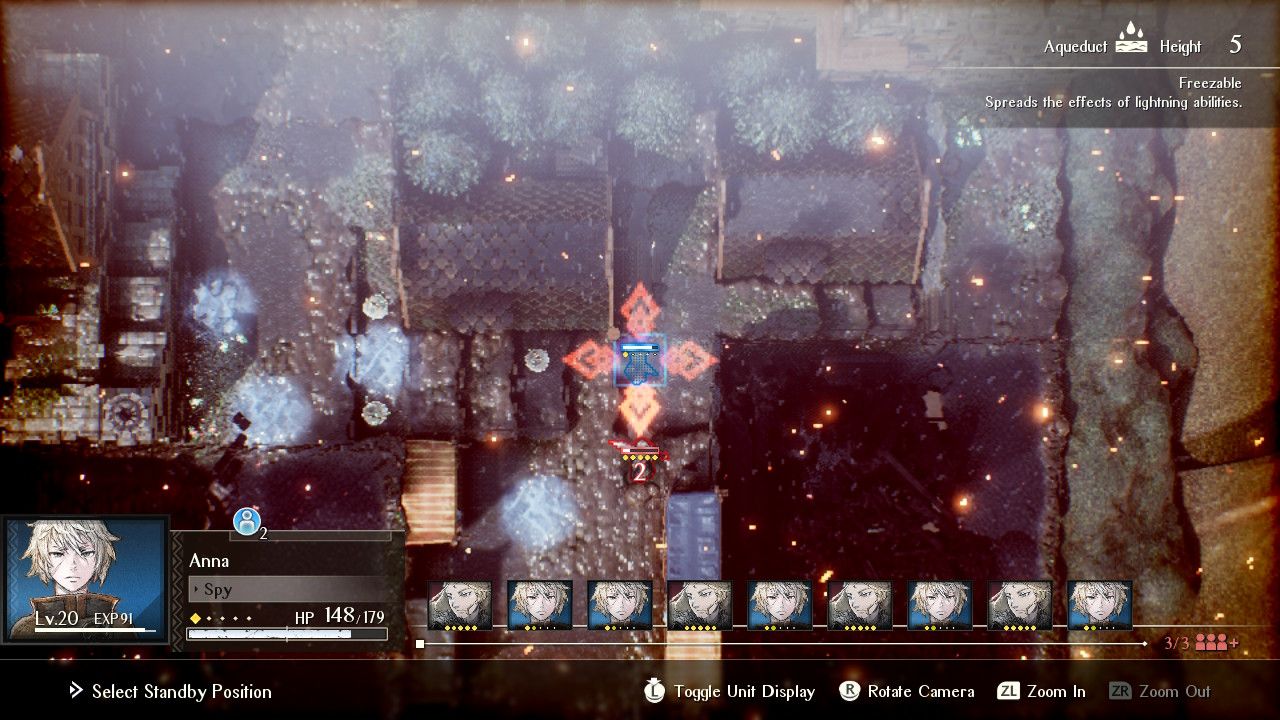
Whenever a character is talking, you can press a button to bring up their profile, which includes their title, allegiance, and an illustrated portrait. This is a nice feature that allows you to keep track of the game’s many characters and their allegiances. And the music is good too! There is a lot of it and it’s all composed in a grandiose, orchestral style. TS’s music gives its story an epic feel and helped a lot to maintain my interest while I was playing.
Final Thought or Two
Ultimately, this game is still unfinished, and I’ve only played two chapters of a demo version of a final game that will have at least seven chapters, and maybe double or triple that. A lot of effort has obviously gone into TS, and there are plenty of promising ideas, but the game is crucially missing the story-flow, well-written dialogue, and core game design reworking that it needs to be masterful.

